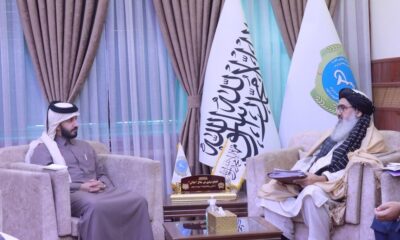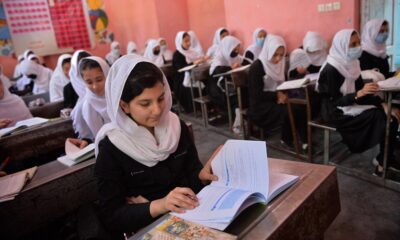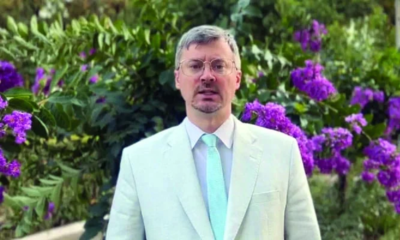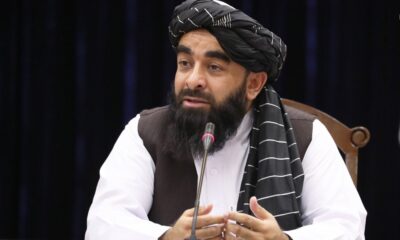Regional
Iranians vote in run-off presidential race amid widespread apathy
According to Reuters only 48% of voters participated in the 2021 election that brought Raisi to power, and turnout was 41% in a parliamentary election in March.
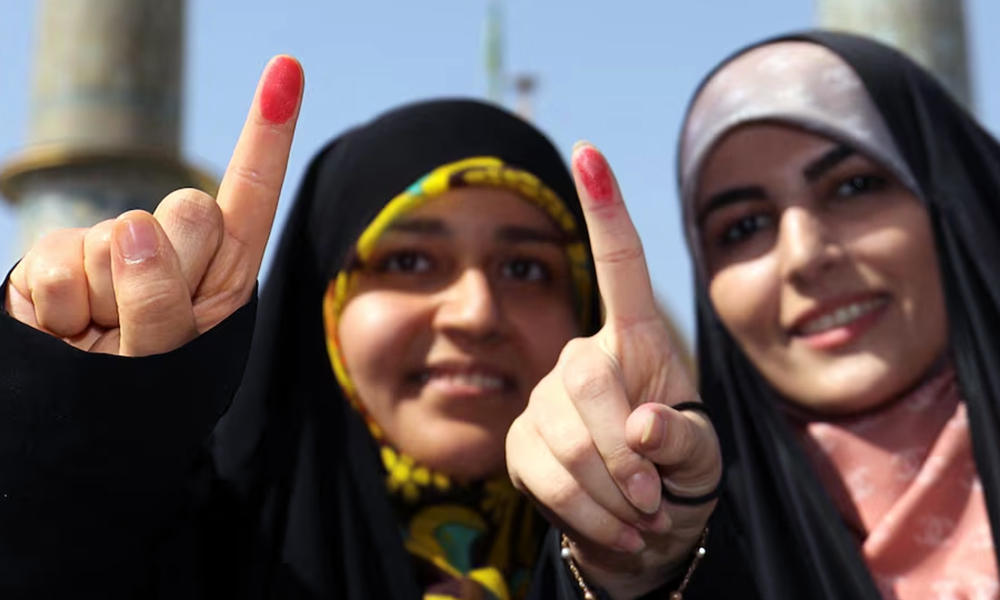
Polls opened in Iran on Friday for a run-off presidential election that will test the clerical rulers’ popularity amid voter apathy at a time of regional tensions and a standoff with the West over Tehran’s nuclear programme, Reuters reported.
State TV said polling stations opened their doors to voters at 8 a.m. local time (0430 GMT). Polling will end at 6 p.m. (1430 GMT), but are usually extended until as late as midnight. The final result will be announced on Saturday, although initial figures may come out sooner.
The run-off follows a June 28 ballot with historic low turnout, when over 60% of Iranian voters abstained from the snap election for a successor to Ebrahim Raisi, following his death in a helicopter crash. The low participation is seen by critics as a vote of no confidence in the Islamic Republic.
The vote is a tight race between low-key lawmaker Masoud Pezeshkian, the sole moderate in the original field of four candidates, and hardline former nuclear negotiator Saeed Jalili.
While the poll will have little impact on the Islamic Republic’s policies, the president will be closely involved in selecting the successor to Ayatollah Ali Khamenei, Iran’s 85-year-old supreme leader who calls all the shots on top state matters, read the report.
“I have heard that people’s zeal and interest is higher than in the first round. May God make it this way as this will be gratifying news,” Khamenei told state TV after casting his vote.
Khamenei acknowledged on Wednesday “a lower than expected turnout” in earlier voting, but said “it is wrong to assume those who abstained in the first round are opposed to the Islamic rule”.
Voter turnout has plunged over the past four years, which critics say shows support for the system has eroded amid growing public discontent over economic hardship and curbs on political and social freedoms.
According to Reuters only 48% of voters participated in the 2021 election that brought Raisi to power, and turnout was 41% in a parliamentary election in March.
The election coincides with escalating regional tension due to the war between Israel and Iranian allies Hamas in Gaza and Hezbollah in Lebanon, as well as increased Western pressure on Iran over its fast-advancing nuclear programme.
“Voting gives power …even if there are criticisms, people should vote as each vote is like a missile launch (against enemies),” Iran’s Revolutionary Guards Aerospace Commander Amirali Hajizadeh told state media.
The next president is not expected to produce any major policy shift on Iran’s nuclear programme or change in support for militia groups across the Middle East, but he runs the government day-to-day and can influence the tone of Iran’s foreign and domestic policy.
The rivals are establishment men loyal to Iran’s theocratic rule, but analysts said a win by anti-Westerner Jalili would signal a potentially even more antagonistic domestic and foreign policy.
A triumph by Pezeshkian might promote a pragmatic foreign policy, ease tensions over now-stalled negotiations with major powers to revive the nuclear pact, and improve prospects for social liberalisation and political pluralism.
However, many voters are sceptical about Pezeshkian’s ability to fulfil his campaign promises as the former health minister has publicly stated that he had no intention of confronting the powerful security hawks and clerical rulers.
Many Iranians still have painful memories of the handling of nationwide unrest sparked by the death in custody of a young Iranian-Kurdish woman Mahsa Amini in 2022, which was quelled by a violent state crackdown involving mass detentions and even executions.
“I will not vote. This is a big NO to the Islamic Republic because of Mahsa (Amini). I want a free country, I want a free life,” said university student Sepideh, 19, in Tehran.
The hashtag #ElectionCircus has been widely posted on social media platform X since last week, with some activists at home and abroad calling for an election boycott, arguing that a high turnout would legitimise the Islamic Republic.
Both candidates have vowed to revive the flagging economy, beset by mismanagement, state corruption and sanctions reimposed since 2018 after the U.S. ditched Tehran’s 2015 nuclear pact with six world powers, Reuters reported.
Related Stories:
Iran’s presidential election dominated by Khamenei loyalists
Regional
Pakistan, China in talks about security for Chinese nationals
Chinese nationals have been targeted by separatist militants who believe Beijing is helping Pakistan exploit minerals in Balochistan
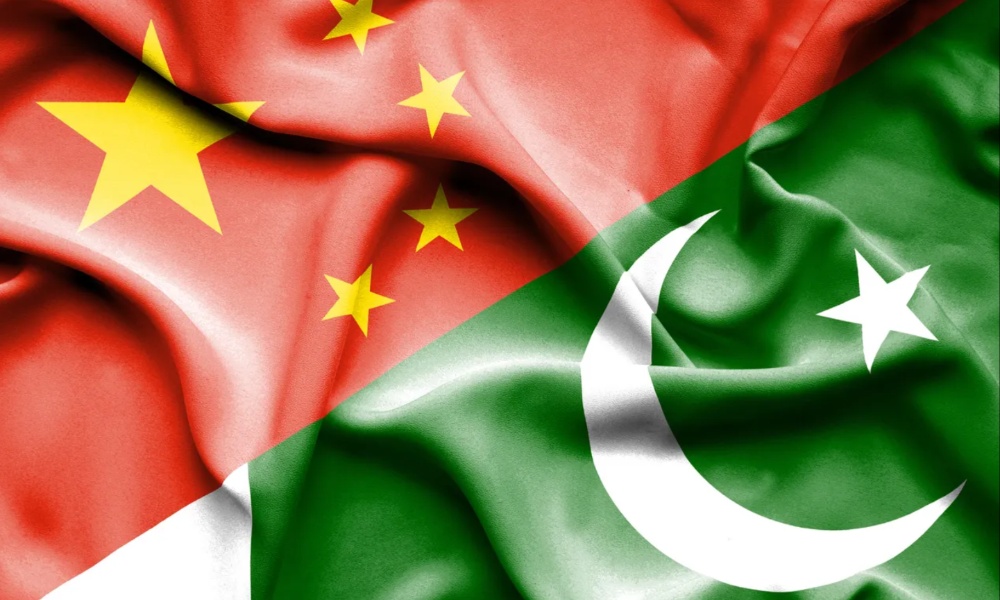
Pakistan and China’s discussions about security measures to protect Chinese nationals working in the South Asian country are a work in progress, Islamabad’s ambassador to Beijing said on Wednesday.
Chinese nationals have been in the crosshairs of separatist militants who believe Beijing is helping Pakistan exploit minerals in the underdeveloped southwestern province of Balochistan, where China has a strategic port and mining interests, Reuters reported.
It is Pakistan’s “national responsibility” and the country is “doing everything possible”, Ambassador Khalil Hashmi told reporters at the sidelines of the Boao Forum in China’s Hainan province.
“I think our two countries work very closely in terms of information sharing, in terms of developing the standard operating procedures” to ensure Chinese nationals working in Pakistan are safe, he said.
“We keep our Chinese friends informed of the steps that we are taking, so it’s a work in progress.”
Beijing has been pushing Pakistan to allow its own security staff to provide protection to thousands of Chinese citizens working there, frustrated by the string of attacks on its citizens.
The push came after a bombing at the Karachi airport last October killed two Chinese engineers who were returning there to work at a power plant.
Hashmi said those talks are ongoing, with a high degree of trust between both countries.
“It’s a complex security environment,” he said, “We have the capability to resolve, to counter and combat and defeat these terrorist forces.”
Regional
Egypt makes new proposal to restore Gaza truce as Israeli strikes kill 65
Palestinian officials on Sunday put the number of dead from nearly 18 months of conflict at over 50,000, read the report.
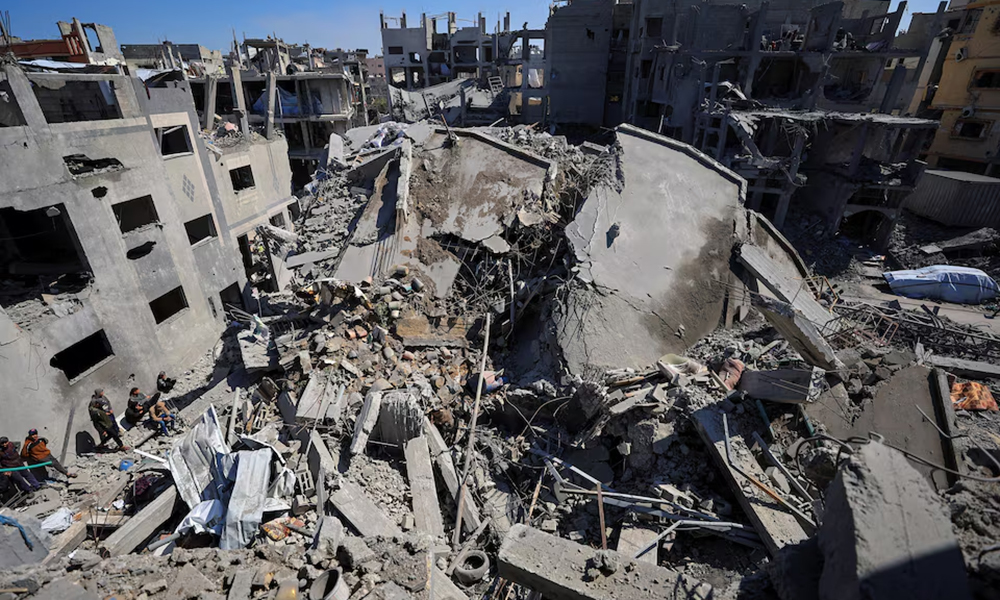
Egypt has floated a new proposal aimed at restoring the Gaza ceasefire deal, security sources told Reuters on Monday, as Palestinian health authorities said Israeli strikes had killed at least 65 people in the enclave in the previous 24 hours, Reuters reported.
The proposal, made last week, follows an escalation in violence after Israel resumed air and ground operations against Hamas militants on March 18, ending a two-month period of relative calm after 15 months of war.
Gaza health officials said Israeli airstrikes and shelling have killed nearly 700 Palestinians since then, including at least 400 women and children.
Among those killed on Monday were two local journalists, Mohammad Mansour and Hussam Shabat, medics said. The Palestinian Journalist Syndicate said at least 206 journalists have been killed by Israeli fire in Gaza since early October 2023, when the conflict erupted. There was no immediate Israeli comment.
Islamist group Hamas said several of its senior political and security officials had also been killed, read the report.
Later on Monday, the Israeli military said it had intercepted a missile launched from Yemen before it crossed into Israel. Warning sirens had sounded in Jerusalem, Tel Aviv and other areas. Iran-aligned Houthi forces in Yemen have at times fired missiles at Israel in support of Hamas fighters.
The Egyptian plan calls for Hamas to release five Israeli hostages each week, with Israel implementing the second phase of the ceasefire after the first week, two security sources said.
Hamas is still holding 59 hostages, with 24 thought to be still alive, among the more than 250 it seized in its October 7, 2023 cross-border attack on Israel. Most of the rest have been freed, or their bodies handed over, in negotiated exchanges.
Both the U.S. and Hamas have agreed to the proposal, the security sources said, but Israel has not yet responded, Reuters reported.
A Hamas official did not confirm the proposed offer, but told Reuters that “several proposals are being discussed with the mediators to bridge the gap and to resume negotiations to reach common ground that would pave the way to start the second phase of the agreement”.
The sources said the Egyptian proposal includes a timeline for a full Israeli military withdrawal from Gaza, backed by U.S. guarantees, in exchange for the release of remaining hostages.
Hamas has accused Israel of breaking the terms of the January ceasefire agreement but has said it is willing to negotiate a renewed truce and was studying proposals from U.S. President Donald Trump’s special envoy, Steve Witkoff.
Israel says it resumed its military operations to force Hamas to release the remaining hostages it is holding in Gaza.
On Monday, Hamas released a video it said showed hostages Elkana Bohbot, 35, and Yosef Haim-Ohana, 24, who were both abducted from the Nova music festival site on October 7.
Israel says it does its best to reduce harm to civilians and has questioned the death toll provided by health authorities in the Hamas-run enclave.
Palestinian officials on Sunday put the number of dead from nearly 18 months of conflict at over 50,000, read the report.
Israel launched its offensive in Gaza after Hamas fighters stormed southern Israel on October 7, 2023, killing 1,200 people, mostly civilians, according to Israeli tallies.
In Gaza’s southernmost city Rafah, the municipality said thousands of people were stuck inside the Tel Al-Sultan district where some Israeli military forces had entered, with families trapped among the ruins, with no water, food, or medicine.
The Palestinian Civil Emergency Service said 50,000 residents remained cornered in Rafah, which abuts the border with Egypt.
The Israeli military said troops had encircled Tel Al-Sultan to dismantle “terror infrastructure sites and eliminate terrorists in the area”.
A United Nations spokesperson said on Monday it would reduce its footprint in Gaza after five staff members of its Palestinian relief agency UNRWA were killed in the renewed conflict, but remains committed to providing aid to civilians.
Separately, UNRWA said 124,000 Palestinians have been displaced in Gaza in recent days.
“Families carry what little they have with no shelter, no safety, and nowhere left to go. The Israeli authorities have cut off all aid. Food is scarce and prices are soaring. This is a humanitarian catastrophe. The siege must end,” UNRWA said on X.
Regional
Trump’s offer of talks with Iran aims to avoid military action, US envoy says
Speaking separately on CBS News, the White House’s national security advisor, Mike Waltz, said the U.S. sought “full dismantlement” of Iran’s nuclear program.
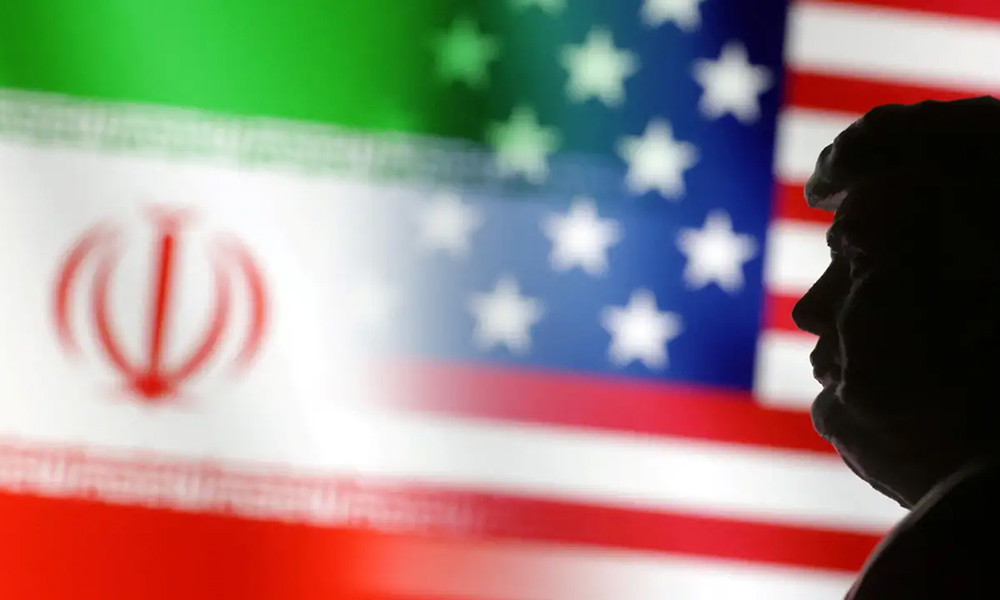
U.S. President Donald Trump’s outreach to Iran’s top authority, Supreme leader Ayatollah Ali Khamenei, on a possible new nuclear deal is an effort to avoid military action, U.S. special envoy Steve Witkoff said on Sunday.
“We don’t need to solve everything militarily,” Witkoff told Fox News.
“Our signal to Iran is let’s sit down and see if we can, through dialogue, through diplomacy, get to the right place. If we can, we are prepared to do that. And if we can’t, the alternative is not a great alternative.”
Trump said earlier this month that he had sent a letter to Khamenei, warning that “there are two ways Iran can be handled: militarily, or you make a deal.”
Khamenei rejected the U.S. offer for talks as “a deception,” saying negotiating with the Trump administration would “tighten the knot of sanctions and increase pressure on Iran.”
However, Iran’s foreign minister, Abbas Araqchi, said on Thursday that Tehran would soon reply to both the letter’s “threats and opportunities.” He cautioned on Sunday that talks with the U.S. are impossible unless Washington changes its pressure policy.
Speaking separately on CBS News, the White House’s national security advisor, Mike Waltz, said the U.S. sought “full dismantlement” of Iran’s nuclear program.
“Iran has to give up its program in a way that the entire world can see,” he said.
“As President Trump has said, this is coming to a head. All options are on the table and it is time for Iran to walk away completely from its desire to have a nuclear weapon.”
Tehran has long said the program is only for peaceful purposes.
U.N. nuclear watchdog chief Rafael Grossi said last month that time is running out for a deal to rein in Iran’s nuclear program as Tehran continues to accelerate its enrichment of uranium to near weapons grade.
While leaving the door open for a nuclear pact with Tehran, Trump has reinstated the “maximum pressure” campaign he applied in his first term as president, including efforts to drive the country’s oil exports to zero.
The U.S. has issued four rounds of sanctions on Iran’s oil sales since Trump’s return to the White House on January 20.
-

 Latest News5 days ago
Latest News5 days agoAmerican freed by IEA reunited with wife, former cellmate, in US
-
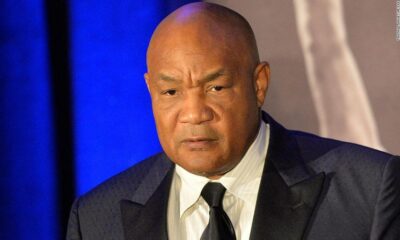
 International Sports4 days ago
International Sports4 days agoBoxing legend George Foreman dies at 76
-

 International Sports3 days ago
International Sports3 days agoRCB bring fireworks to opening night of IPL 2025
-
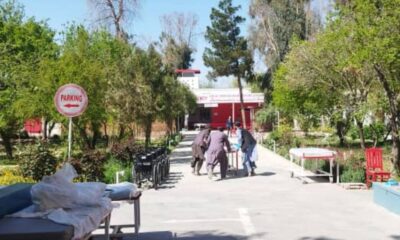
 Latest News4 days ago
Latest News4 days agoEighteen injured after dispute between two brothers in Helmand
-
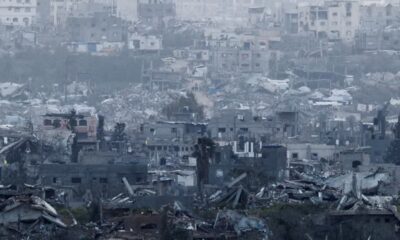
 Regional4 days ago
Regional4 days agoHamas studies US ‘bridge’ proposal for truce as Israel escalates return to war
-
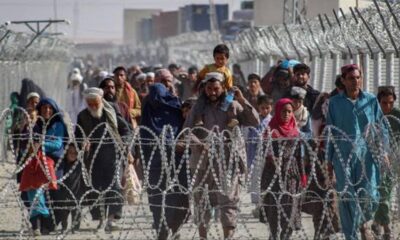
 Latest News3 days ago
Latest News3 days agoTorkham border reopens for pedestrians
-
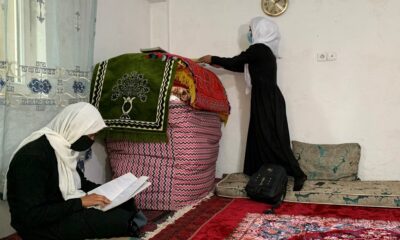
 Latest News4 days ago
Latest News4 days agoBan on girls’ education in Afghanistan will be ‘catastrophic’: UNICEF
-

 International Sports2 days ago
International Sports2 days agoIPL 2025: Sunrisers on a batting rampage; triumph over Rajasthan Royals






